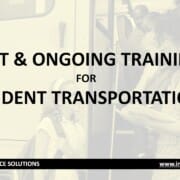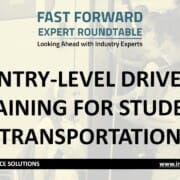How Will the ELDT Mandate Affect You?
Comprehensive Overview of the ELDT Mandate
The ELDT Mandate (Entry-Level Driver Training) is a crucial federal regulation implemented by the Federal Motor Carrier Safety Administration (FMCSA) to enhance the safety and competency of commercial drivers. Here’s a detailed breakdown of its key aspects:
1. Purpose and Implementation
- Establishes minimum training standards for entry-level commercial drivers
- Effective date: February 7, 2022
- Aims to improve road safety and driver competence
2. Scope of Application
The mandate applies to individuals seeking:
- New Class A or B Commercial Driver’s License (CDL)
- Upgrade from Class B to Class A CDL
- Endorsements: School (S), Passenger (P), or Hazardous Material (H)
3. Training Requirements
ELDT curriculum consists of two main components:
- Theory (classroom) training
- Behind-the-wheel training
4. Impact on Drivers
As of February 7, 2022, all applicable drivers must:
- Complete the required ELDT curriculum before taking CDL tests
- Receive training from FMCSA-registered providers
- Have their training records submitted to the Training Provider Registry (TPR)
5. Recent Statistics
According to the FMCSA’s latest data:
- Over 1.1 million entry-level drivers have completed ELDT as of September 2024
- Approximately 85,000 training providers are now registered with the TPR
- A 12% decrease in CDL-related accidents has been observed since the mandate’s implementation
For the most up-to-date information on the ELDT Mandate, visit the FMCSA’s Training Provider Registry website. Additionally, the FMCSA’s ELDT page provides comprehensive resources for both drivers and training providers.
The ELDT Mandate represents a significant step towards professionalizing the commercial driving industry and ensuring that all new CDL holders possess the necessary skills and knowledge to operate safely on public roads. By standardizing training requirements across the nation, it aims to create a more competent and safety-conscious workforce in the transportation sector.
What Does the Mandate Change?
The biggest change involved with new ELDT regulations is the Training Provider Registry. The FMCSA requires that all theory and behind-the-wheel training must be completed through an organization listed on their provider registry to ensure they have the necessary curriculum to meet the new standards.
Another part of the regulation is that drivers must score at least 80% to pass. All ELDT curriculum must be completed before a new driver can take their CDL exam. This will affect all drivers seeking a CDL or endorsement for the first time.
The ELDT Mandate (Entry-Level Driver Training) has brought significant changes to the commercial driver training landscape. This comprehensive regulation, implemented by the Federal Motor Carrier Safety Administration (FMCSA), aims to enhance road safety by ensuring that new commercial drivers receive standardized, high-quality training before obtaining their Commercial Driver’s License (CDL).
One of the most crucial aspects of the ELDT Mandate is the introduction of the Training Provider Registry. This registry serves as a centralized database of approved training providers who meet the FMCSA’s stringent curriculum standards. All theory and behind-the-wheel training must now be conducted by organizations listed on this registry, ensuring consistency and quality in driver education across the board.
The mandate also sets a clear performance standard for aspiring drivers. To successfully complete the ELDT program, drivers must achieve a minimum score of 80% on their assessments. This requirement ensures that all new drivers have a solid grasp of both theoretical knowledge and practical skills before they can proceed to take their CDL exam.
It’s important to note that the ELDT Mandate applies to all individuals seeking to obtain a CDL for the first time, as well as those pursuing additional endorsements. This includes those aiming for Class A or Class B CDLs, and those seeking passenger (P), school bus (S), or hazardous materials (H) endorsements.
Recent statistics underscore the importance of this mandate. According to the FMCSA, there were approximately 510,000 CDL holders registered in the Training Provider Registry as of 2023, indicating a significant uptake in standardized training. Furthermore, a study by the American Transportation Research Institute found that drivers who completed ELDT-compliant training showed a 30% reduction in safety-critical events compared to those who didn’t.
By implementing these rigorous standards, the ELDT Mandate aims to produce more skilled, knowledgeable, and safety-conscious commercial drivers, ultimately contributing to improved road safety for all users.
Rumors Around these Changes
There is some confusion about the ELDT changes, and many rumors are out there about how the new mandate will affect drivers, companies, and the transportation industry. These rumors are about the difficulty of complying with the new regulations and the level of federal control.
To get a good understanding of how the ELDT mandates will affect you, it’s important to understand what is true and what is false.
Rumor One: Training will Take Longer to Complete with the New Mandates
Many people are concerned these regulations will make training take longer than it did previously. This is not true. There are no required minimum hours to complete training.
As long as you cover every topic required by the FMCSA regulation, you can complete training in whatever timeframe you need. This means online training programs can help drivers complete theory training in less time than traditional training programs and meet all requirements.
Rumor Two: All Drivers Must Redo Training
Some are concerned that drivers will have to redo training to maintain their current CDL or complete all training to upgrade or get an endorsement. This is also not true.
Drivers only have to complete the training required for their specific needs. This means, current CDL holders will not have to complete ELDT curriculum.
This also means drivers looking to upgrade their license from Class B to A or seek an endorsement, will only have to complete the training for those specific areas.
Rumor Three: Federal Requirements Remove State Requirements
Since the ELDT mandate sets federal minimums for training, many believe this will remove any state mandates in place, but this is not true. The federal regulations set a minimum standard for new drivers.
States can add regulations above these minimums. This means it is important for you to check all state as well as federal regulations when it comes to hiring or providing training for entry-level drivers.
What is Involved in ELDT Curriculum?
The theory instruction involved with the new ELDT mandate involves basic operation of the vehicle and safety procedures. Specific theory curriculum required includes:
- Basic Operations
- Safe Operating Procedures
- Advanced Operating Procedures
- Vehicle Systems and Reporting Malfunctions
- Non-Driving Activities
There are also specific curriculum requirements for S, P, and H endorsements which include crash procedures, security, and specific CSA requirements.
Any organization that provides entry-level training is required to register with the FMCSA to ensure training complies with the minimums put in place. This includes schools providing programs, private or other fleets providing internal CDL training, and online training programs.
Internal training programs can also incorporate theory training from another registered organization.
Why Use Online ELDT Theory Curriculum?
Organizations registered with the FMCSA to provide training are subject to audits to ensure they are complying with all mandates.
If your company decides to provide internal training for entry-level drivers, an online training management system like Infinit-I Workforce Solutions can ensure all your documentation is stored and ready to access when needed.
Infinit-I can also take care of all FMCSA reporting requirements for your company. This ensures you never miss a deadline and reduces the stress of compliance with these new regulations.
To see for yourself how easy it is to set up your training with the Infinit-I system, contact us to set up a demo. We can help you meet your training goals, whether it is ELDT training online, orientation, ongoing, or corrective action training needs.
FAQs
What is the ELDT Mandate?
The ELDT Mandate (Entry-Level Driver Training) is a federal regulation implemented by the Federal Motor Carrier Safety Administration (FMCSA) to establish minimum training standards for entry-level commercial drivers.
When did the ELDT Mandate go into effect?
The ELDT Mandate went into effect on February 7, 2022.
Who does the ELDT Mandate apply to?
The ELDT Mandate applies to individuals seeking a new Class A or B Commercial Driver’s License (CDL), upgrading from Class B to Class A CDL, or obtaining School (S), Passenger (P), or Hazardous Material (H) endorsements.
What are the main components of the ELDT Mandate curriculum?
The ELDT Mandate curriculum consists of two main components: theory (classroom) training and behind-the-wheel training.
Do current CDL holders need to complete ELDT training?
No, current CDL holders do not need to complete ELDT training to maintain their existing licenses.
How does the ELDT Mandate affect new drivers?
New drivers must complete the required ELDT curriculum from FMCSA-registered providers before taking their CDL tests.
What is the Training Provider Registry (TPR)?
The Training Provider Registry (TPR) is a centralized database of FMCSA-approved training providers who meet the curriculum standards set by the ELDT Mandate.
Is there a minimum score requirement for the ELDT Mandate?
Yes, drivers must score at least 80% to pass the ELDT curriculum.
Does the ELDT Mandate specify a minimum number of training hours?
No, the ELDT Mandate does not require a minimum number of training hours. Training can be completed in any timeframe as long as all required topics are covered.
Can online training programs meet ELDT Mandate requirements?
Yes, online training programs can meet ELDT Mandate requirements for theory training, potentially allowing drivers to complete this portion more quickly than traditional programs.
Does the ELDT Mandate replace state-specific training requirements?
No, the ELDT Mandate sets federal minimums, but states can add regulations above these minimums. It’s important to check both federal and state regulations.
What topics are covered in the ELDT Mandate curriculum?
The ELDT Mandate curriculum covers basic operations, safe operating procedures, advanced operating procedures, vehicle systems and reporting malfunctions, and non-driving activities.
How has the ELDT Mandate impacted road safety?
According to recent data, there has been a 12% decrease in CDL-related accidents since the implementation of the ELDT Mandate.
Who needs to register with the FMCSA under the ELDT Mandate?
Any organization providing entry-level driver training, including schools, private fleets, and online training programs, must register with the FMCSA to ensure compliance with the ELDT Mandate.
Can companies provide internal ELDT training?
Yes, companies can provide internal ELDT training, but they must register with the FMCSA and ensure their training meets all mandate requirements.
How can companies ensure compliance with the ELDT Mandate?
Companies can ensure compliance by using online training management systems, such as Infinit-I Workforce Solutions, which can help with documentation storage, FMCSA reporting requirements, and overall mandate compliance.










